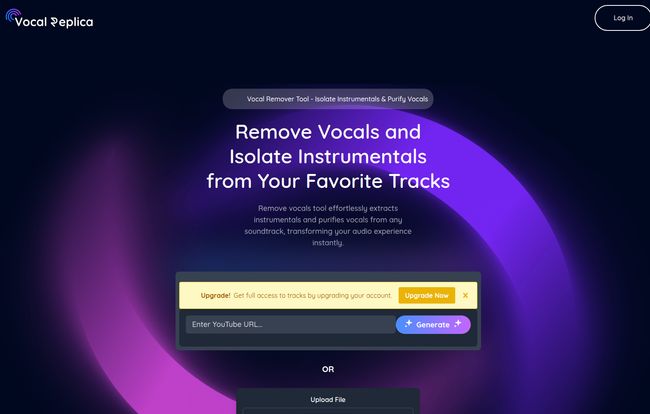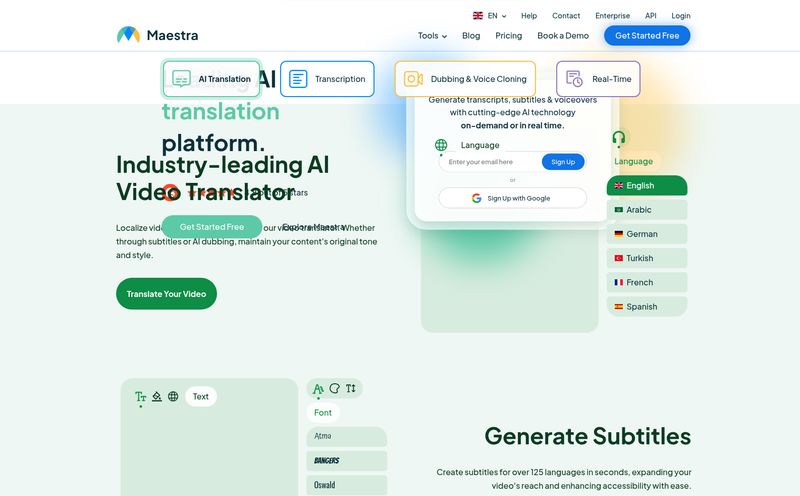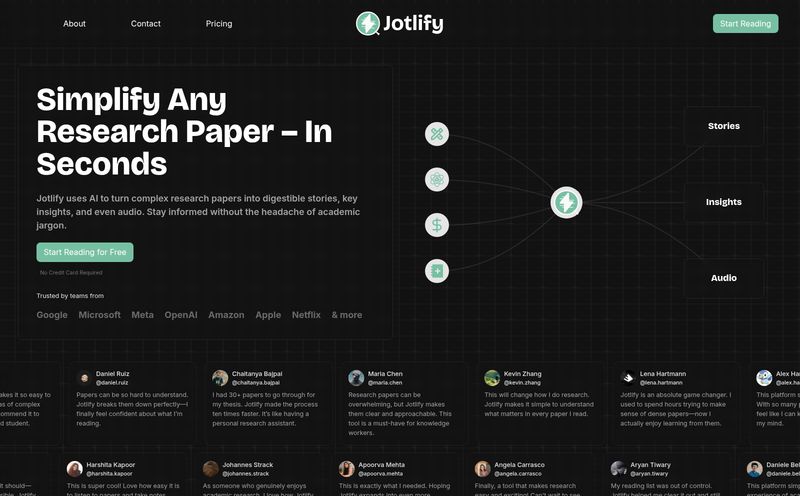I’ve been in the digital marketing and content game for a long time. And I remember the 'bad old days' of audio editing. I'm talking about spending an entire weekend in college trying to isolate the bassline from a Funkadelic track using Audacity. It involved inverting phases, a ton of EQ guesswork, and the final result sounded like it was recorded in a tin can at the bottom of a swimming pool. The struggle was real, folks.
We wanted clean instrumentals for background music, or a cappella vocals for a remix, and the tools were just… clumsy. Fast forward to today, and AI is changing the creative process at a dizzying speed. We’ve all seen the AI image generators and the text bots, but the world of AI audio production is where things are getting seriously interesting. And that brings me to a tool I’ve been playing with recently: Vocal Replica. It landed on my radar and I had to see if it lived up to the hype.
So What Exactly is Vocal Replica?
At first glance, Vocal Replica looks deceptively simple. The website is clean, dark-themed, and gets straight to the point. No fluff. It has a dual personality that immediately grabbed my attention. On one hand, it’s a powerful vocal remover and instrumental isolation tool. On the other, it’s a full-blown AI voice cloning platform. It's like a digital audio Swiss Army knife for creators.
You’re presented with two simple options: paste a YouTube URL or upload an audio file. That's it. This directness is something I really apreciate. It knows what it does, and it puts the tools right in your hands without a ten-step tutorial. It’s built for people who want to get a job done, and fast.
Putting the Vocal Remover to the Test
Naturally, the first thing I did was test the vocal remover. I have a go-to test track for this—an old, slightly poorly mixed indie song I love, but whose vocals are a bit buried. In the past, trying to extract the instrumental from this track was a nightmare.
With Vocal Replica, I just grabbed the YouTube link, pasted it in the box, and hit 'Generate'. A few moments later, I had two separate tracks waiting for me: a clean a cappella and a crisp instrumental.

Visit Vocal Replica
The quality? Honestly, it blew my old Audacity attempts out of the water. The separation was incredibly clean, with minimal artifacts. That tin-can-at-the-bottom-of-the-pool sound was gone, replaced by something genuinely usable. The platform mentions 'Advanced noise reduction' and 'Purify Vocals,' and it's not just marketing fluff. You can hear it. For any musician wanting to create a backing track for practice, or a DJ looking for the perfect a cappella to layer into a set, this is an absolute game-changer. It just works.
The Brave New World of AI Voice Cloning
Alright, separating tracks is cool. But voice cloning? That feels like we're stepping into the future. Vocal Replica’s other main feature is its ability to create a high-quality clone of a voice, again, just from a YouTube video. The implications for this are huge.
Imagine you’re a content creator. You could clone your own voice to generate audio for short-form videos, social media posts, or even ad reads without having to set up your mic every single time. It’s about consistency and efficiency. For podcasters, it could mean fixing a botched sentence in post-production with a perfectly matched voice.
Of course, a tool this powerful comes with a need for responsible use. The ethics of voice cloning is a massive conversation in the tech world right now, and it's on us as creators to use these tools for good—not for mischief. Vocal Replica is providing the tech; it's our job to provide the conscience.
One thing to note is that cloning multiple distinct speakers from a single audio source is a premium feature. And that's fair. The computational work required for that is significantly more complex, so it makes sense that it would be reserved for paid tiers.
Who is This Tool Actually For?
I can see a few groups getting a ton of value out of Vocal Replica.
For Musicians and DJs
This one's a no-brainer. The ability to instantly create studio-quality a cappellas and instrumentals is invaluable. You can create remixes, mashups, and karaoke tracks in minutes, not hours. It’s a creative accelerant that opens up possibilities that were once locked behind technical skill or expensive software.
For Content Creators and YouTubers
Need royalty-free background music? Find a song you like, run it through Vocal Replica, and use the instrumental. Need to grab a clean voice line from an interview for a video essay? Done. The workflow simplification here is immense, cutting out so many tedious steps we used to just accept as part of the job.
For Marketers and Podcasters
This is a more niche use-case, but a powerful one. Consistency in branding is everything. Imagine being able to generate quick audio snippets for social media ads in a consistent brand voice, even if your main voice talent isn't available. Or, as mentioned, for cleaning up podcast audio. It’s a problem-solver.
Let's Talk Money: Vocal Replica Pricing
Okay, so how much does this magic cost? The pricing structure is refreshingly straightforward and based on minutes of processing time. There seems to be a limited free trial to let you get your feet wet, which I always support. After that, you're looking at a few tiers.
| Plan | Price | Minutes Included | Cost Per Minute (Approx.) |
|---|---|---|---|
| Starter | $4.99 | 100 | ~$0.05 |
| Standard | $9.99 | 300 | ~$0.033 |
| Premium | $14.99 | 500 | ~$0.03 |
In my opinion, this is very reasonable. The Starter plan at five bucks is less than a fancy latte and gives you more than an hour and a half of processing. It's the perfect entry point to see how it fits into your workflow. As you move up, the cost-per-minute drops, rewarding heavier users. For anyone serious about content or music, the Standard or Premium plans offer fantastic value.
The Good, The Bad, and The Nitty-Gritty
What I Genuinely Liked
The sheer simplicity is the biggest win. The YouTube URL integration is the killer feature, period. It cuts out so many annoying middle steps of downloading and re-uploading files. The audio output quality is also top-notch for a web-based tool. It competes with, and often beats, dedicated desktop software. It’s fast, effective, and doesn't require a degree in audio engineering to use.
A Few Things to Keep in Mind
No tool is perfect for everyone. The fact that advanced multi-speaker voice cloning is a premium feature is something to be aware of if that's your primary goal. The limited free usage means you can test it, but you'll need to pull out your wallet for any serious work. Lastly, it requires JavaScript to run, but let's be honest, what modern web application doesn't? It’s hardly a drawback unless you’re browsing from a potato.
The Final Verdict on Vocal Replica
So, is Vocal Replica worth it? For me, it's a resounding yes. It’s a powerful, focused tool that solves a very real problem for a huge number of creative people. It takes complex audio engineering tasks and makes them as simple as copy-and-paste.
It's not going to replace a professional audio engineer for a major studio album, but it's not trying to. It’s democratizing high-quality audio manipulation, putting incredible power into the hands of independent creators. Whether you’re a musician, a podcaster, a YouTuber, or just someone who's curious about the future of audio, Vocal Replica is an impressive piece of kit that's definitely worth a look.
Frequently Asked Questions (FAQ)
What file formats does Vocal Replica support?
You can upload MP3, WAV, FLAC, and M4A files directly to the platform, in addition to using YouTube URLs.
Can I really clone a voice just from a YouTube video?
Yes. The AI analyzes the voice from the video you provide and creates a high-quality digital replica. The clearer the audio in the source video, the better the result will be.
Is there a free trial for Vocal Replica?
There is limited free usage available, which allows you to test the core functionality before committing to a paid plan. This is great for seeing if the quality and workflow meet your needs.
Is it legal to use the separated vocals or cloned voices?
This is an important question. For vocal separation, using instrumentals for personal practice or a cappellas for a private DJ set is generally fine. Using them in public or commercial projects can infringe on copyright. For voice cloning, it's critical to have permission from the person whose voice you are cloning. Always respect copyright and personal rights.
How good is the audio separation quality?
In my experience, it's excellent for a web-based tool. It uses advanced algorithms that produce very clean separations with minimal 'bleeding' or artifacts, far better than traditional manual methods.
What's the main difference between the pricing plans?
The primary difference is the number of processing minutes you get. All plans offer the same core features of vocal/instrumental isolation from YouTube or uploaded files. The cost per minute becomes cheaper on the higher-tiered plans.
Conclusion
Tools like Vocal Replica represent a fascinating shift in the creative landscape. They lower the barrier to entry for high-level production and free up creators to focus on the big ideas, not the tedious technical tasks. It’s powerful, easy to use, and fairly priced. If you work with audio in any capacity, you owe it to yourself to give it a spin. You might just find it's the tool you didn't know you needed, either.
Reference and Sources
- Vocal Replica Official Website
- Vocal Replica Pricing Page
- Forbes: The Wild West Of AI Voice Cloning Is Here - An article discussing the broader context of voice cloning technology.



